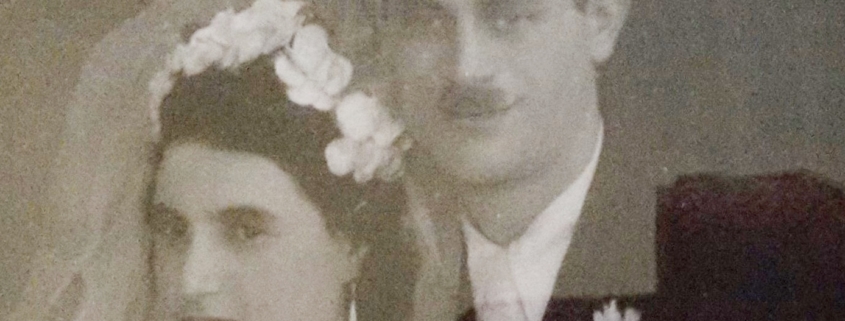She Named Her Daughter Chaya “Life”
By Third Generation Storykeeper Yonat Assayag
Bobby knew her mom, sisters and grandmother were all killed. But she hadn’t seen Joe since he slipped her those sweaters that first day in Auschwitz. She also had no idea what happened to her three older brothers. She traveled for a while after the war looking for them, first to Prague, then Budapest. In Budapest, she got word that one of her older brothers, Zoli, was in another Hungarian city, Chop, looking for his sisters. Chop was a railway hub and many survivors found themselves there after the war. When Bobby got to Chop, she found not just Zoli, but also her other older brothers, Andor and Hershel. Joe, whom they had heard was dead, arrived in Chop a few months later, very much alive.
Bobby met my grandfather, Alex, in Chop. Alex was instructed by the Hungarians to watch over the Jews working in the soup kitchen to make sure they didn’t try to rise up against the Hungarians in retaliation for all they’d been through. Bobby’s brothers became close friends with Alex and they introduced him to Bobby. Alex had lost his wife and a son in the camps. Within just a few months, my grandparents were engaged and married. Soon after their wedding, as Czechoslovakia was starting to restrict people from leaving, they smuggled across the border to Slovac and waited for my grandfather’s brother, Jack, who was living in the United States, to send them immigration visas. Finally, in 1948 the visas arrived and my grandparents, along with their one-year old daughter, my mother, traveled safely to the US. My mother’s English name is Alice. Her Hebrew name is Chaya, which was Bobby’s mother’s name. Coincidentally, in Hebrew, Chaya means “life,” making her name even more poignant as she is the first child of two Holocaust survivors.
Bobby lived in the United States for the rest of her life. From what I could tell, she spent that life living in the present, never the past, appreciating everything she had. She took great pride in her home. She was a real Balabusta (a Yiddish expression describing a good homemaker). Her home was modest, but it was immaculate. Of course, the plastic furniture coverings helped. And it always smelled of something delicious in the oven or on the stove. She also took great pride in how she looked. She was never too embarrassed to be seen in her old housecoat, or “shmata,” as she called it, but boy did she love dressing up. One of my favorite memories is sitting on Bobby’s bed as she would show me the beautiful Shabbos dresses she’d just bought at TJ Maxx. “Natala, can you believe these prices?!”
Read a Prewar Slice of Yonat’s story
Read a Wartime Slice of Yonat’s story




Please Share Your Comments